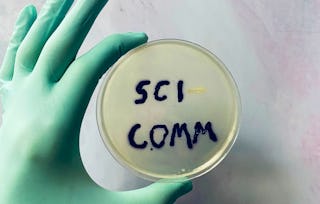In a world of information overload, how does one find reliable information? Science is supposed to be the answer to our society's complicated challenges. However, as the Covid-19 pandemic highlighted, not understanding what is fake news, misinformation or what is fact may lead to widespread public mistrust, or turn science into fuel for conspiracy theories or propaganda. Scientific findings are prone to change, making it difficult to effectively communicate them to the public. This fosters broad public skepticism towards major institutions, from the government to media to science. So, how can we communicate science effectively? And how can we rebuild trust in science? As a result, it is critical that we reconsider our science communication practices to recover public trust.

Science Communication: Communicating Trustworthy Information in the Digital World
6 days left! Gain next-level skills with Coursera Plus for $199 (regularly $399). Save now.

Science Communication: Communicating Trustworthy Information in the Digital World


Instructors: Jason H. Pridmore
3,827 already enrolled
Included with
(61 reviews)
What you'll learn
Learn about the best practices for effective science communication
Understand how different stakeholders (policymakers, scientists, journalists) approach science communication
Learn about the advantages and drawbacks of communicating science in digital media and their implications for public trust.
Develop hands-on skills using tools and resources to evaluate information in digital media.
Skills you'll gain
Details to know

Add to your LinkedIn profile
4 assignments
See how employees at top companies are mastering in-demand skills

There are 8 modules in this course
Welcome to the course! In this module, you will learn about the importance and relevance of effective science communication in the digital world. We will outline various topics and important concepts that will be discussed in the next modules.
What's included
1 video
In this module, you will explore the effects of digital media on science communication and the implications on social trust.
What's included
4 videos1 assignment
In the age of misinformation and fake news, there seems to be a public outcry for ‘trust in science’. This module shows you how social scientists produce knowledge and what challenges they face in communicating science.
What's included
3 videos1 assignment
In this module, you will learn how journalists combat threats like fake news or misinformation. We also discuss how they ensure and navigate responsible and reliable reporting in today’s world.
What's included
4 videos1 discussion prompt
Policymakers make decisions in light of competing opinions on scientific issues. But what should they do to maintain public trust? In this module, you will explore evidence-based policymaking and the crucial role of science communication in the process.
What's included
4 videos1 reading1 assignment
Digital media go hand in hand with misinformation. Why is that? In this module, you will learn how digital media facilitate the spread of (mis)information but also provide the tools to combat it.
What's included
4 videos1 reading1 assignment
As a science communicator, you need to take in mind your audiences’ needs and characteristics to effectively get your messages across. This module will help you understand how people interpret scientific knowledge. Additionally, we look at strategies to engage citizens with science communication.
What's included
4 videos1 reading1 discussion prompt
You are getting to the end of the course. Let’s reflect on your learnings in the previous modules and identify best scientific communication practices we discussed.
What's included
1 video1 discussion prompt
Instructors


Offered by
Explore more from Governance and Society
 Status: Preview
Status: PreviewUniversity of Colorado Boulder
 Status: Free Trial
Status: Free TrialUniversity of Colorado Boulder
 Status: Free Trial
Status: Free TrialUniversity of Colorado Boulder
 Status: Free
Status: FreeUniversity of Alberta
Why people choose Coursera for their career

Felipe M.

Jennifer J.

Larry W.

Chaitanya A.
Learner reviews
- 5 stars
63.93%
- 4 stars
29.50%
- 3 stars
4.91%
- 2 stars
1.63%
- 1 star
0%
Showing 3 of 61
Reviewed on Mar 19, 2024
Great course important to every communicator and scientist
Reviewed on Aug 10, 2024
In my view, this is very good course for anyone who wants to learn communicating science to the citizens. This course will serve you as a launching pad in the field of science communication.
Reviewed on Apr 9, 2025
Didn't know what to expect, but this was a really well organized and super informative course! Communicates a lot in a short amount of time (given the amount of info).
Frequently asked questions
To access the course materials, assignments and to earn a Certificate, you will need to purchase the Certificate experience when you enroll in a course. You can try a Free Trial instead, or apply for Financial Aid. The course may offer 'Full Course, No Certificate' instead. This option lets you see all course materials, submit required assessments, and get a final grade. This also means that you will not be able to purchase a Certificate experience.
When you purchase a Certificate you get access to all course materials, including graded assignments. Upon completing the course, your electronic Certificate will be added to your Accomplishments page - from there, you can print your Certificate or add it to your LinkedIn profile.
Yes. In select learning programs, you can apply for financial aid or a scholarship if you can’t afford the enrollment fee. If fin aid or scholarship is available for your learning program selection, you’ll find a link to apply on the description page.
More questions
Financial aid available,





